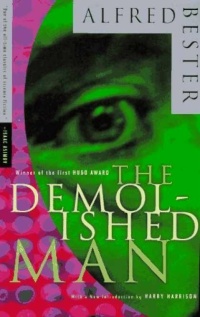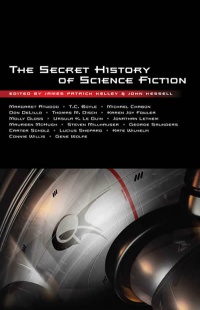WWHG.” ‘Offer refused.’ Refused! REFUSED! I knew it!” Reich shouted. “All right, D’Courtney. If you won’t let it be merger, then I’ll make it murder.”
Title: The Demolished Man
Author: Alfred Bester
Year: 1953
Rating: 3/5 stars
 I’m happy to say I’m all caught up on essential Bester. Last year I had the pleasure of reading The Stars My Destination, and now I’ve finished the other of Bester’s two novels of great renown, The Demolished Man. Personally, I enjoyed Stars a good deal more and consider it the superior of the two books. However, as Bester’s first published novel and the winner of the very first Hugo award, The Demolished Man is certainly worthy in its own right. Like Stars, it presents a tale of personal obsession and vengeance set against the backdrop of an evolving humanity that has acquired an astounding new ability — in this case, telepathy.
I’m happy to say I’m all caught up on essential Bester. Last year I had the pleasure of reading The Stars My Destination, and now I’ve finished the other of Bester’s two novels of great renown, The Demolished Man. Personally, I enjoyed Stars a good deal more and consider it the superior of the two books. However, as Bester’s first published novel and the winner of the very first Hugo award, The Demolished Man is certainly worthy in its own right. Like Stars, it presents a tale of personal obsession and vengeance set against the backdrop of an evolving humanity that has acquired an astounding new ability — in this case, telepathy.
Perhaps part of the reason I liked the other book more was that Gully Foyle is a much more sympathetic character than Ben Reich. Although both of them pursue their quests with little regard for the laws of society, at least Foyle, one may feel, was somewhat justified in his actions; he was wronged in some way. Reich, on the other hand, comes across as simply an arrogant, greedy, super-rich bully throwing his power around to get what he wants. It is interesting, though, that these two preeminent works of SF both involve such “bad boys.” Bester seems to have a rather high opinion of these rebels:
But it [capital punishment] doesn’t make sense. If a man’s got the talent and guts to buck society, he’s obviously above average. You want to hold on to him. You straighten him out and turn him into a plus value. Why throw him away? Do that enough and all you’ve got left is the sheep.
Actually that short quote offers a lot worth thinking about: rebellion and individual initiative versus social conformity, as well as punishment versus rehabilitation. Speaking of punishment, Bester had me wondering throughout the novel just what “demolition” was — sinister name, that. Surely I can’t be the only reader who expected it to be some sort of matter annihilator that criminals were thrown into, or some such? Bester certainly built up my “apprehension” with that.
One of the more interesting aspects of the book, of course, is its portrayal of what society might look like with a sizable percentage of telepaths among the population. Bester’s Espers number in the tens of thousands, if I recall correctly, and have become entrenched in all major areas of life: business, medicine, entertainment, government, the judicial system, and so on. This would no doubt have far-reaching effects on the world, not the least of which is that deception and crime of all varieties would be much more difficult to get away with (much to Reich’s chagrin). Telepathic ability is mostly presented in a positive light here, as a potential force for good and for humanity’s improvement. However, there is also the possibility for exploitation, and the existence of telepathy doesn’t magically erase all of mankind’s characteristic flaws. The police Esper Powell reflects on this (angrily) during his dealings with the entertainer and brothel owner, Chooka Frood:
It was anger for the relentless force of evolution that insisted on endowing man with increased powers without removing the vestigial vices that prevented him from using them.
I really enjoyed the battle of wits between Reich and Powell, with Powell trying everything he can think of to prove Reich’s guilt, and Reich doing everything in his power to foil him. The book flies along at a relentless, breakneck pace, true to form for Bester. I can’t say that every part of the story works for me, or that it’s my favorite from this author, but it is classic Bester, no doubt about that, and worthy of attention.

 After experiencing (and loving) Dan Simmons’ take on space opera as displayed in his
After experiencing (and loving) Dan Simmons’ take on space opera as displayed in his 














